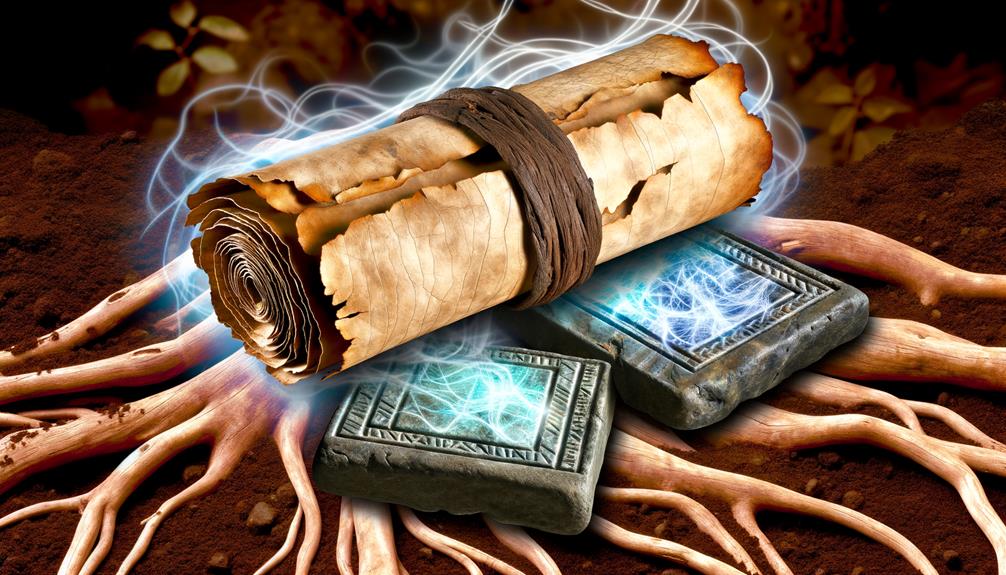Heart of the Earth Bible Meaning: Spiritual Significance
In Matthew 12:40, the phrase ‘heart of the earth‘ resonates deeply for me as it signifies Jesus’ burial and His profound spiritual descent. It aligns with prophecy, depicting His entombment for three days, and symbolizes His deep connection to human suffering.
This phrase isn’t just literal; it also reflects Jesus’ triumph over sin and death, emphasizing His ultimate sacrifice and redemption for humanity. Understanding this profound moment in Scripture invites one to explore the layers of its spiritual and theological significance, revealing the depth of God’s love and the hope offered through resurrection.

Biblical Meaning of “Heart of the Earth”: Jesus’ Burial, Sacrifice, and Resurrection
| Interpretation | Meaning | Explanation |
|---|---|---|
| Jesus’ Death and Burial | Refers to the period Jesus spent in the tomb following His crucifixion. | In Matthew 12:40, Jesus says, “For as Jonah was three days and three nights in the belly of a huge fish, so the Son of Man will be three days and three nights in the heart of the earth,” referring to His death and burial before resurrection. |
| Symbol of Humility and Sacrifice | Represents the ultimate humility and sacrifice of Jesus for humanity’s sins. | The “heart of the earth” symbolizes Jesus’ willingness to descend into death, experiencing the depths of human suffering and sin to offer salvation to the world. |
| The Grave and Spiritual Darkness | Refers to the grave or a state of being spiritually separated from life. | “Heart of the earth” can also symbolize the grave, representing death and spiritual separation before the resurrection. It reflects the spiritual darkness that Jesus overcame. |
| Fulfillment of Prophecy | Fulfills Old Testament prophecies of the Messiah’s death and resurrection. | Jesus’ time in the “heart of the earth” fulfilled prophecies, like those in Isaiah 53, which foretold the Messiah’s suffering, death, and ultimate triumph over death. |
| Resurrection Hope | Highlights the promise of resurrection and new life through Christ’s victory over death. | The “heart of the earth” not only points to Jesus’ burial but also the hope of resurrection, symbolizing the victory of life over death, and sin being conquered. |
| Parallel to Jonah’s Experience | Draws a parallel between Jonah’s three days in the fish and Jesus’ time in the tomb. | Jesus directly parallels His time in the “heart of the earth” with Jonah’s three days in the belly of the fish, representing both a time of suffering and the anticipation of divine deliverance. |
Biblical References

The phrase ‘heart of the earth‘ appears prominently in Matthew 12:40, where Jesus draws a parallel between His forthcoming burial and Jonah’s three days in the belly of the great fish.
When I read this passage, I see a profound link between Old and New Scriptures events, emphasizing God’s plan for redemption.
Jesus uses this phrase to foretell His own death and resurrection, echoing Jonah’s miraculous deliverance.
This comparison not only fulfills prophecy but also highlights the depth of Jesus’ sacrifice.
Literal Interpretation

Examining the literal interpretation of the phrase ‘heart of the earth’ provides a foundation for understanding its significance in both the prophecy and the fulfillment of Jesus’ resurrection. The phrase can be understood literally as referring to Jesus’ physical burial in the tomb, which was located within the earth. This aligns with the biblical prophecy that Jesus would be “three days and three nights in the heart of the earth” (Matthew 12:40).
| Aspect | Description |
|---|---|
| Phrase Origin | Biblical Prophecy |
| Literal Meaning | Jesus’ Physical Burial |
| Time Frame | Three Days and Three Nights |
| Location | Within the Earth (Tomb) |
Metaphorical Meaning

Understanding the metaphorical meaning of ‘heart of the earth‘ invites us to explore deeper into its spiritual and symbolic significance within the Christian faith.
I believe this phrase often symbolizes Jesus’ profound connection to humanity‘s deepest struggles and the transformative power of His resurrection.
When Jesus mentioned being in the ‘heart of the earth,’ He wasn’t just referring to His physical burial but also to His descent into the depths of human sin and suffering.
This metaphorical journey serves as a powerful reminder that Christ meets us in our darkest moments, offering hope and redemption.
For those of us committed to serving others, this understanding reinforces our mission to bring light and compassion to those in need.
Theological Perspectives

As I examine the theological perspectives on the phrase ‘heart of the earth,’ I focus on scriptural interpretations, historical context, and doctrinal implications.
I analyze how various theologians have understood this term within the broader biblical narrative.
Scriptural Interpretations Analyzed
In theological circles, we often explore deeply into the phrase ‘heart of the earth‘ to uncover its rich scriptural implications and nuanced meanings.
I’ve found that many scholars interpret this phrase as a reference to Jesus Christ’s burial and His time in the tomb. This period symbolizes profound spiritual truths about redemption, sacrifice, and divine love.
By understanding the ‘heart of the earth’ as the grave, we recognize Christ’s willingness to descend into our deepest sorrows and struggles. This interpretation invites us to serve others with the same selfless love.
It’s a call to embody the transformative power of resurrection in our daily lives, reflecting the profound mystery of Christ’s journey from death to life.
Historical Context Considered
Examining the historical context of the phrase ‘heart of the earth‘ through various theological perspectives reveals a profound connection between ancient Jewish burial practices and the Christian understanding of Christ’s entombment.
When I look at Jewish customs, I see that burials often took place in caves or tombs carved into rock, which symbolized returning to the earth. This practice illuminates Jesus’ statement about being in the ‘heart of the earth’ for three days and three nights.
Theologically, this indicates not just physical burial but also a deeper spiritual descent into the domain of the dead. Understanding these historical nuances helps us appreciate the profound layers of meaning in Christ’s journey, bridging ancient traditions with Christian faith, and inspiring us to serve others with deeper insight.
Doctrinal Implications Explored
The doctrinal implications of Jesus’ reference to the ‘heart of the earth‘ compel us to explore the depths of Christian theology, particularly the concepts of atonement, resurrection, and the harrowing of hell.
Jesus’ descent signifies His atonement for our sins, embodying the ultimate sacrifice. His resurrection from the heart of the earth confirms God’s power over death, offering believers the promise of eternal life.
The harrowing of hell, often associated with this period, illustrates Jesus’ victory over evil, liberating the righteous who’d died before His crucifixion.
These profound doctrines not only shape our understanding of salvation but also inspire our mission to serve others with the hope and love exemplified by Christ’s journey into and triumph over death.
Historical Context

Understanding the historical context of the phrase ‘heart of the earth‘ reveals its rich theological and cultural significance within the biblical narrative.
In biblical times, this phrase was often used metaphorically to describe moments of profound spiritual and physical trial.
When Jesus referenced it in Matthew 12:40, it drew from Jewish traditions and prophetic literature, particularly Jonah’s three days in the belly of the fish. The fish symbolism in biblical context is also significant in Christian tradition, where the fish became a symbol of Christ and his followers. Jesus’ reference to Jonah’s time in the belly of the fish was seen as a foreshadowing of his own death and resurrection. This connection between Jonah and Jesus further emphasized the prophetic significance of the three days, reinforcing the belief in Jesus as the promised Messiah.
This allusion wasn’t just a prediction of Jesus’ own death and resurrection, but also a profound teaching on divine compassion and redemption.
Cultural Significance

When considering the cultural significance of the phrase ‘heart of the earth,’ I find it essential to examine both its ancient symbolism and its modern interpretations.
This phrase has been rich with meaning across various cultures and epochs, reflecting deep spiritual and existential themes.
Ancient Symbolism Overview
Exploring the ancient symbolism of the ‘heart of the Earth‘ reveals profound cultural and spiritual insights that have shaped human understanding of our connection to the divine.
I find that in many ancient cultures, the ‘heart’ represents the core of existence, the sacred center from which life emanates. This symbolism isn’t just poetic; it’s a theological cornerstone.
In Hebrew scripture, the Earth’s heart is seen as a place of profound spiritual trial and transformation. Similarly, early Christian texts interpret this as Christ’s descent into the grave, embodying ultimate sacrifice and redemption.
Understanding these ancient symbols invites us to reflect on our spiritual journeys, emphasizing humility and compassion as we seek to serve others in our own lives.
Modern Interpretations Analysis
Countless modern interpretations of the ‘heart of the Earth‘ build upon ancient foundations, intertwining cultural significance with contemporary spiritual reflections.
I’ve observed that many view this phrase as a metaphor for deep introspection and connection to one’s inner self, aligning it with the quest for spiritual fulfillment. This interpretation resonates deeply with those seeking to serve others, as it emphasizes understanding and empathy derived from profound self-awareness.
Additionally, some see it as a call to environmental stewardship, urging us to care for the planet as a sacred duty. This dual perspective not only enriches our spiritual lives but also fosters a sense of communal responsibility, urging us to act with compassion and mindfulness in our daily endeavors.
Scholarly Debates

Scholarly debates surrounding the phrase ‘heart of the earth‘ often revolve around its theological implications and historical interpretations within biblical exegesis.
I’ve found that some scholars argue it signifies Jesus’ burial and descent into Sheol, while others see it as a metaphor for His intense suffering and separation from God.
These interpretations aren’t just academic; they influence how we comprehend Christ’s sacrifice and resurrection.
As believers committed to serving others, it’s essential to grasp these nuances. They deepen our appreciation of the Scriptures and enable us to share its profound truths more effectively.
Modern Interpretations

In light of contemporary theological discourse, modern interpretations of the phrase ‘heart of the earth‘ often blend historical context with present-day faith perspectives to uncover its enduring significance.
I find that many scholars see it as a metaphor for Jesus’ burial and resurrection, symbolizing the ultimate act of divine love and sacrifice.
This interpretation encourages us to reflect on our own spiritual journeys.
By understanding the ‘heart of the earth’ as a place of transformation and renewal, we’re called to embrace our roles in fostering compassion and service.
It’s not just about historical events, but a call to live out the teachings of Christ in our everyday lives, seeking to uplift and support those around us.
Conclusion
In unraveling the profound mystery of the ‘heart of the earth,’ we’ve journeyed through a labyrinth of biblical references, theological musings, and historical contexts.
This phrase isn’t just a simple metaphor; it’s a celestial treasure trove of divine wisdom, revealing layers of God’s plan and human redemption!
Our exploration has unearthed an astonishing tapestry of spiritual insights that challenge and enrich our faith, proving that this enigmatic phrase holds the universe’s secrets within its sacred syllables.






